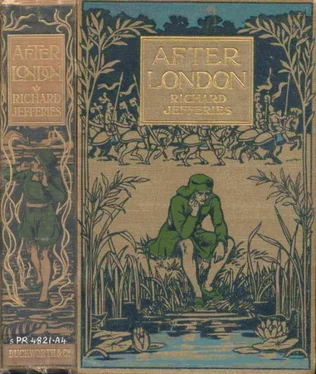Richard Jefferies - After London
Здесь есть возможность читать онлайн «Richard Jefferies - After London» весь текст электронной книги совершенно бесплатно (целиком полную версию без сокращений). В некоторых случаях можно слушать аудио, скачать через торрент в формате fb2 и присутствует краткое содержание. Город: London, Год выпуска: 1905, Издательство: Duckworth & Co., Жанр: sf_postapocalyptic, на английском языке. Описание произведения, (предисловие) а так же отзывы посетителей доступны на портале библиотеки ЛибКат.
- Название:After London
- Автор:
- Издательство:Duckworth & Co.
- Жанр:
- Год:1905
- Город:London
- ISBN:нет данных
- Рейтинг книги:4 / 5. Голосов: 1
-
Избранное:Добавить в избранное
- Отзывы:
-
Ваша оценка:
- 80
- 1
- 2
- 3
- 4
- 5
After London: краткое содержание, описание и аннотация
Предлагаем к чтению аннотацию, описание, краткое содержание или предисловие (зависит от того, что написал сам автор книги «After London»). Если вы не нашли необходимую информацию о книге — напишите в комментариях, мы постараемся отыскать её.
(1885), set in a future in which urban civilization has collapsed after an environmental crisis.” (From
).
This eBook is for the use of anyone anywhere at no cost and with almost no restrictions whatsoever. You may copy it, give it away or re-use it under the terms of the Project Gutenberg License included with this eBook or online at
* * *
After London — читать онлайн бесплатно полную книгу (весь текст) целиком
Ниже представлен текст книги, разбитый по страницам. Система сохранения места последней прочитанной страницы, позволяет с удобством читать онлайн бесплатно книгу «After London», без необходимости каждый раз заново искать на чём Вы остановились. Поставьте закладку, и сможете в любой момент перейти на страницу, на которой закончили чтение.
Интервал:
Закладка:
There was not much conversation on the trail to Heron Bay. The serfs were still there in charge of the canoe, and were glad enough to see their approach, and thus to be relieved from their lonely watch. They launched the canoe with ease, the provisions were put on board, the chest lashed to the mast that it might not be lost, the favourite bow was also fastened upright to the mast for safety, and simply shaking hands with Oliver, Felix pushed out into the creek. He paddled the canoe to the entrance and out into the Lake till he arrived where the south-west breeze, coming over the forest, touched and rippled the water, which by the shore was perfectly calm.
Then, hoisting the sail, he put out the larger paddle which answered as a rudder, took his seat, and, waving his hand to Oliver, began his voyage. The wind was but light, and almost too favourable, for he had determined to sail to the eastward; not for any specific reason, but because there the sun rose, and that was the quarter of light and hope. His canoe, with a long fore-and-aft sail, and so well adapted for working into the wind, was not well rigged for drifting before a breeze, which was what he was now doing. He had merely to keep the canoe before the wind, steering so as to clear the bold headland of White Horse which rose blue from the water’s edge far in front of him. Though the wind was light, the canoe being so taper and sharp at the prow, and the sail so large in comparison, slipped from the shore faster than he at first imagined.
As he steered aslant from the little bay outwards into the great Lake, the ripples rolling before the wind gradually enlarged into wavelets, these again increased, and in half an hour, as the wind now played upon them over a mile of surface, they seemed in his canoe, with its low freeboard, to be considerable waves. He had purposely refrained from looking back till now, lest they should think he regretted leaving, and in his heart desired to return. But now, feeling that he had really started, he glanced behind. He could see no one.
He had forgotten that the spot where they had launched the canoe was at the end of an inlet, and as he sailed away the creek was shut off from view by the shore of the Lake. Unable to get to the mouth of the bay because of the underwood and the swampy soil, Oliver had remained gazing in the direction the canoe had taken for a minute or two, absorbed in thought (almost the longest period he had ever wasted in such an occupation), and then with a whistle turned to go. The serfs, understanding that they were no longer required, gathered their things together, and were shortly on their way home. Oliver, holding Felix’s horse by the bridle, had already ridden that way, but he presently halted, and waited till the three men overtook him. He then gave the horse into their charge, and turning to the right, along a forest path which branched off there, went to Ponze. Felix could therefore see no one when he looked back, and they were indeed already on their way from the place.
He now felt that he was alone. He had parted from the shore, and from all the old associations; he was fast passing not only out upon the water, but out into the unknown future. But his spirit no longer vacillated; now that he was really in the beginning of his long contemplated enterprise his natural strength of mind returned. The weakness and irresolution, the hesitation, left him. He became full of his adventure, and thought of nothing else.
The south-west breeze, blowing as a man breathes, with alternate rise and fall, now driving him along rapidly till the water bubbled under the prow, now sinking, came over his right shoulder and cooled his cheek, for it was now noon, and the June sun was unchecked by clouds. He could no longer distinguish the shape of the trees on shore; all the boughs were blended together in one great wood, stretching as far as he could see. On his left there was a chain of islands, some covered with firs, and others only with brushwood, while others again were so low and flat that the waves in stormy weather broke almost over them.
As he drew near White Horse, five white terns, or sea-swallows, flew over; he did not welcome their appearance, as they usually preceded rough gales. The headland, wooded to its ridge, now rose high against the sky; ash and nut-tree and hawthorn had concealed the ancient graven figure of the horse upon its side, but the tradition was not forgotten, and the site retained its name. He had been steering so as just to clear the promontory, but he now remembered that when he had visited the summit of the hill, he had observed that banks and shoals extended far out from the shore, and were nearly on a level with the surface of the Lake. In a calm they were visible, but waves concealed them, and unless the helmsman recognised the swirl sufficiently early to change his course, they were extremely dangerous.
Felix bore more out from the land, and passing fully a mile to the north, left the shoals on his right. On his other hand there was a sandy and barren island barely a quarter of a mile distant, upon which he thought he saw the timbers of a wreck. It was quite probable, for the island lay in the track of vessels coasting along the shore. Beyond White Horse, the land fell away in a series of indentations, curving inwards to the south; an inhospitable coast, for the hills came down to the strand, ending abruptly in low, but steep, chalk cliffs. Many islands of large size stood out on the left, but Felix, not knowing the shape of the Lake beyond White Horse, thought it best to follow the trend of the land. He thus found, after about three hours, that he had gone far out of his course, for the gulf-like curve of the coast now began to return to the northward, and looking in that direction he saw a merchant vessel under her one square sail of great size, standing across the bay.
She was about five miles distant, and was evidently steering so as to keep just inside the line of the islands. Felix, with some difficulty, steered in a direction to interrupt her. The south-west wind being then immediately aft, his sail did not answer well; presently he lowered it, and paddled till he had turned the course so that the outrigger was now on the eastern side. Then hoisting the sail again, he sat at what had before been the prow, and steered a point or so nearer the wind. This improved her sailing, but as the merchant ship had at least five miles start, it would take some hours to overtake her. Nor on reflection was he at all anxious to come up with her, for mariners were dreaded for their lawless conduct, being, when on a voyage, beyond all jurisdiction.
On the one hand, if they saw an opportunity, they did not hesitate to land and pillage a house, or even a hamlet. On the other, those who dwelt anywhere near the shore considered it good sport to light a fire and lure a vessel to her destruction, or if she was becalmed to sally out in boats, attack, and perhaps destroy both ship and crew. Hence the many wrecks, and losses, and the risks of navigation, not so much from natural obstacles, since the innumerable islands, and the creeks and inlets of the mainland almost always offered shelter, no matter which way the storm blew, but from the animosity of the coast people. If there was an important harbour and a town where provisions could be obtained, or repairs effected, the right of entrance was jealously guarded, and no ship, however pressed by the gale, was permitted to leave, if she had anchored, without payment of a fine. So that vessels as much as possible avoided the harbours and towns, and the mainland altogether, sailing along beside the islands, which were, for the most part, uninhabited, and anchoring under their lee at night.
Felix, remembering the character of the mariners, resolved to keep well away from them, but to watch their course as a guide to himself. The mainland now ran abruptly to the north, and the canoe, as he brought her more into the wind, sprang forward at a rapid pace. The outrigger prevented her from making any leeway, or heeling over, and the large spread of sail forced her swiftly through the water. He had lost sight of the ship behind some islands, and as he approached these, began to ask himself if he had not better haul down his sail there, as he must now be getting near her, when to his surprise, on coming close, he saw her great square sail in the middle, as it seemed, of the land. The shore there was flat, the hills which had hitherto bounded it suddenly ceasing; it was overgrown with reeds and flags, and about two miles away the dark sail of the merchantman drifted over these, the hull being hidden. He at once knew that he had reached the western mouth of the straits which divide the southern and northern mainland. When he went to see the channel on foot through the forest, he must have struck it a mile or two more to the east, where it wound under the hills.
Читать дальшеИнтервал:
Закладка:
Похожие книги на «After London»
Представляем Вашему вниманию похожие книги на «After London» списком для выбора. Мы отобрали схожую по названию и смыслу литературу в надежде предоставить читателям больше вариантов отыскать новые, интересные, ещё непрочитанные произведения.
Обсуждение, отзывы о книге «After London» и просто собственные мнения читателей. Оставьте ваши комментарии, напишите, что Вы думаете о произведении, его смысле или главных героях. Укажите что конкретно понравилось, а что нет, и почему Вы так считаете.












